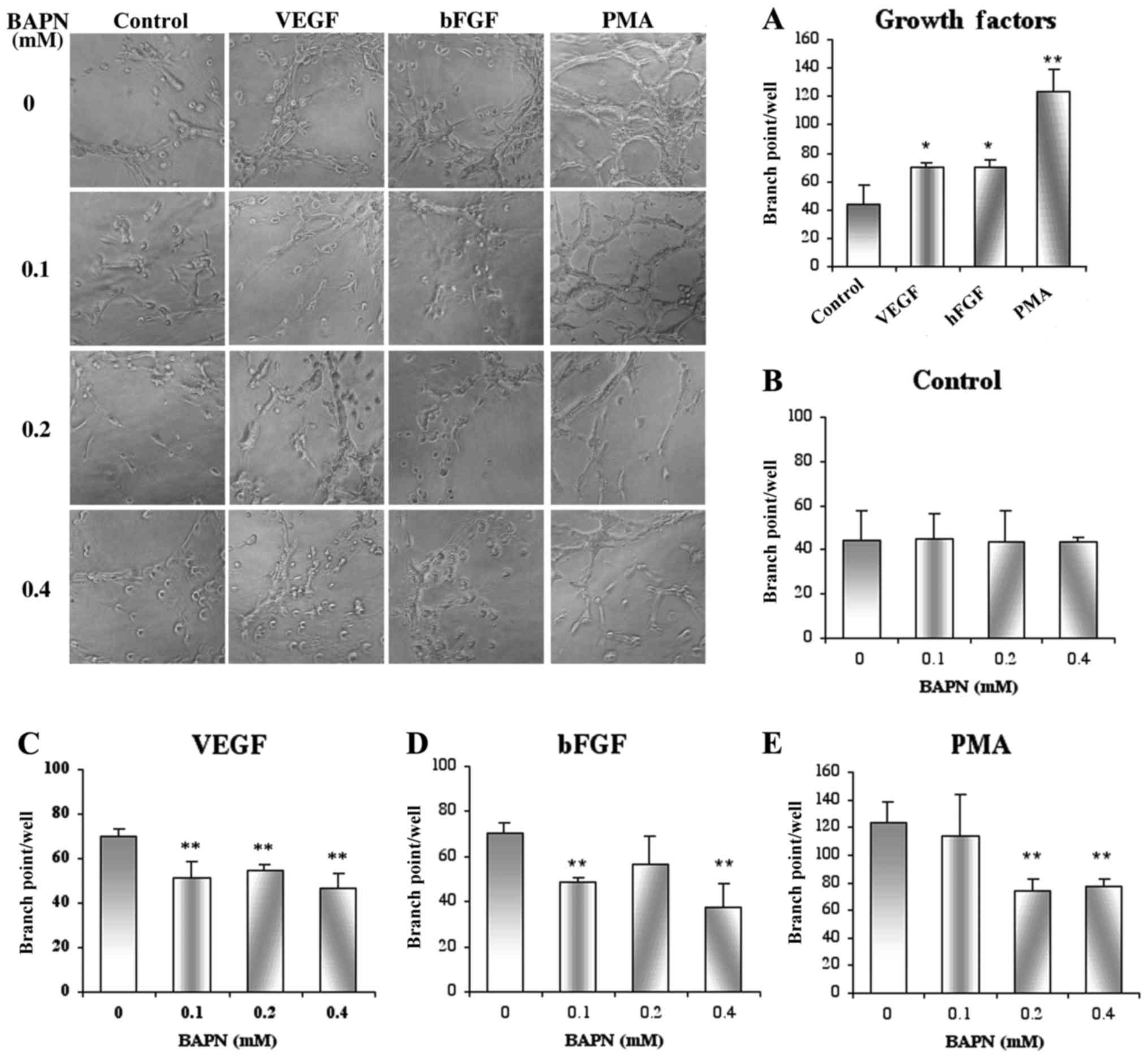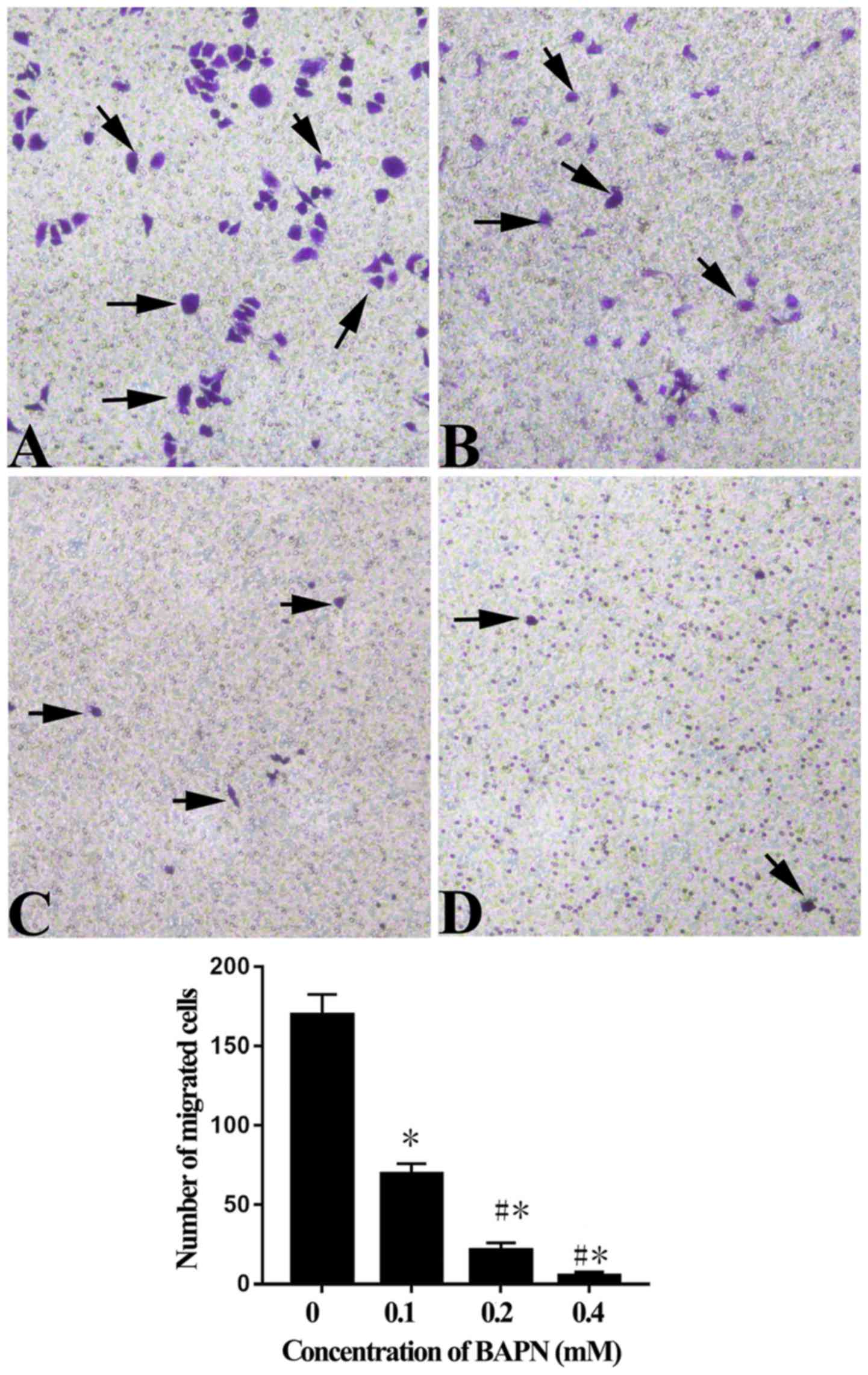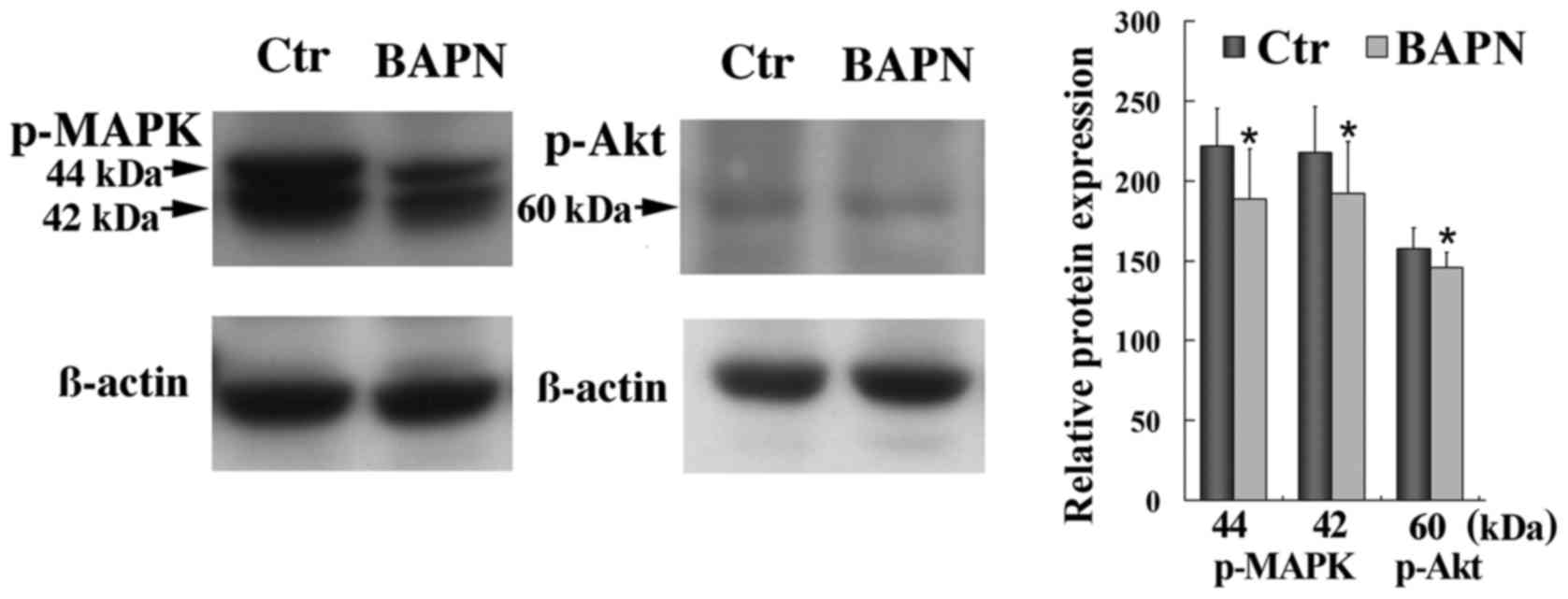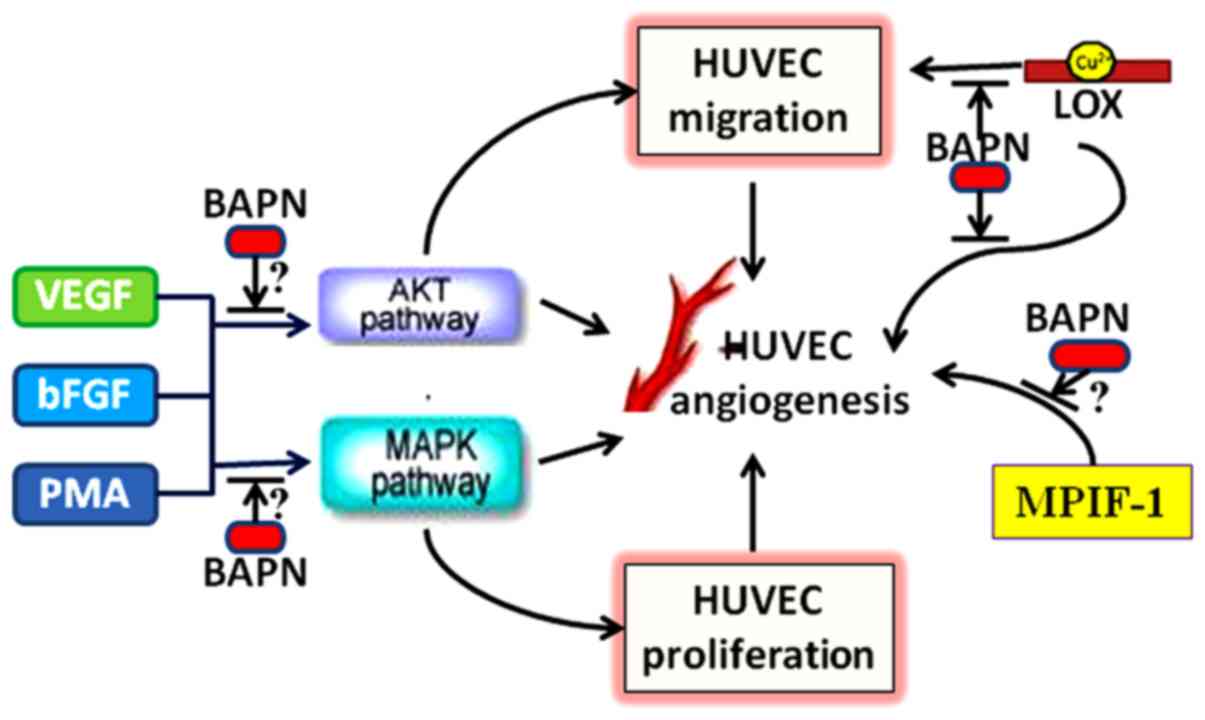|
1
|
Wong VW and Crawford JD: Vasculogenic
cytokines in wound healing. Biomed Res Int. 2013:1904862013.
View Article : Google Scholar : PubMed/NCBI
|
|
2
|
Moon JJ, Saik JE, Poché RA, Leslie-Barbick
JE, Lee SH, Smith AA, Dickinson ME and West JL: Biomimetic
hydrogels with pro-angiogenic properties. Biomaterials.
31:3840–3847. 2010. View Article : Google Scholar : PubMed/NCBI
|
|
3
|
Eelen G, de Zeeuw P, Simons M and
Carmeliet P: Endothelial cell metabolism in normal and diseased
vasculature. Circ Res. 116:1231–1244. 2015. View Article : Google Scholar : PubMed/NCBI
|
|
4
|
Hoang S, Liauw J, Choi M, Choi M, Guzman
RG and Steinberg GK: Netrin-4 enhances angiogenesis and neurologic
outcome after cerebral ischemia. J Cereb Blood Flow Metab.
29:385–397. 2009. View Article : Google Scholar : PubMed/NCBI
|
|
5
|
Weis SM and Cheresh DA: Tumor
angiogenesis: Molecular pathways and therapeutic targets. Nat Med.
17:1359–1370. 2011. View
Article : Google Scholar : PubMed/NCBI
|
|
6
|
Gibofsky A: Overview of epidemiology,
pathophysiology, and diagnosis of rheumatoid arthritis. Am J Manag
Care. 18 13 Suppl:S295–S302. 2012.PubMed/NCBI
|
|
7
|
Wang CX and Shuaib A: Critical role of
microvasculature basal lamina in ischemic brain injury. Prog
Neurobiol. 83:140–148. 2007. View Article : Google Scholar : PubMed/NCBI
|
|
8
|
Gautam J, Zhang X and Yao Y: The role of
pericytic laminin in blood brain barrier integrity maintenance. Sci
Rep. 6:364502016. View Article : Google Scholar : PubMed/NCBI
|
|
9
|
Knapton AD, Zhang J, Sistare FD and Hanig
JP: The use of in situ perfusion of the rat mesentery as a model to
investigate vascular injury directly induced by drugs. Methods Find
Exp Clin Pharmacol. 32:489–497. 2010. View Article : Google Scholar : PubMed/NCBI
|
|
10
|
Kagan HM and Li W: Lysyl oxidase:
Properties, specificity, and biological roles inside and outside of
the cell. J Cell Biochem. 88:660–672. 2003. View Article : Google Scholar : PubMed/NCBI
|
|
11
|
Mäki JM: Lysyl oxidases in mammalian
development and certain pathological conditions. Histol
Histopathol. 24:651–660. 2009.PubMed/NCBI
|
|
12
|
Erez N: Cancer: Opening LOX to metastasis.
Nature. 522:41–42. 2015. View Article : Google Scholar : PubMed/NCBI
|
|
13
|
Perryman L and Erler JT: Lysyl oxidase in
cancer research. Future Oncol. 10:1709–1717. 2014. View Article : Google Scholar : PubMed/NCBI
|
|
14
|
Rodríguez C, Rodríguez-Sinovas A and
Martínez-González J: Lysyl oxidase as a potential therapeutic
target. Drug News Perspect. 21:218–224. 2008. View Article : Google Scholar : PubMed/NCBI
|
|
15
|
Osawa T, Ohga N, Akiyama K, Hida Y,
Kitayama K, Kawamoto T, Yamamoto K, Maishi N, Kondoh M, Onodera Y,
et al: Lysyl oxidase secreted by tumour endothelial cells promotes
angiogenesis and metastasis. Br J Cancer. 109:2237–2247. 2013.
View Article : Google Scholar : PubMed/NCBI
|
|
16
|
Mammoto T, Jiang A, Jiang E, Panigrahy D,
Kieran MW and Mammoto A: Role of collagen matrix in tumor
angiogenesis and glioblastoma multiforme progression. Am J Pathol.
183:1293–1305. 2013. View Article : Google Scholar : PubMed/NCBI
|
|
17
|
Wang F, Wan J, Li Q, Zhang M, Wan Q, Ji C,
Li H, Liu R and Han M: Lysyl oxidase is involved in synovial
hyperplasia and angiogenesis in rats with collagen-induced
arthritis. Mol Med Rep. 16:6736–6742. 2017. View Article : Google Scholar : PubMed/NCBI
|
|
18
|
Sharma-Bhandari A, Park SH, Kim JY, Oh J
and Kim Y: Lysyl oxidase modulates the osteoblast differentiation
of primary mouse calvaria cells. Int J Mol Med. 36:1664–1670. 2015.
View Article : Google Scholar : PubMed/NCBI
|
|
19
|
Yin KJ, Hamblin M and Chen YE:
Angiogenesis-regulating microRNAs and ischemic stroke. Curr Vasc
Pharmacol. 13:352–365. 2015. View Article : Google Scholar : PubMed/NCBI
|
|
20
|
Liu N, Zhang Y, Fan L, Yuan M, Du H, Cheng
R, Liu D and Lin F: Effects of transplantation with bone
marrow-derived mesenchymal stem cells modified by Survivin on
experimental stroke in rats. J Transl Med. 9:1052011. View Article : Google Scholar : PubMed/NCBI
|
|
21
|
Aciksari K, Yanar HT, Hepgul G, Ozucelik
DN, Yanar F, Agcaoglu O, Eser M, Tanriverdi G, Topacoglu H, Ayvaci
BM, et al: The effect of Beta-aminopropionitrile and prednisolone
on the prevention of fibrosis in alkali esophageal burns: An
experimental study. Gastroenterol Res Pract. 2013:5742602013.
View Article : Google Scholar : PubMed/NCBI
|
|
22
|
Miana M, Galán M, Martínez-Martínez E,
Varona S, Jurado-López R, Bausa-Miranda B, Antequera A, Luaces M,
Martínez-González J, Rodríguez C and Cachofeiro V: The lysyl
oxidase inhibitor β-aminopropionitrile reduces body weight gain and
improves the metabolic profile in diet-induced obesity in rats. Dis
Model Mech. 8:543–551. 2015. View Article : Google Scholar : PubMed/NCBI
|
|
23
|
Shibuya M: Vascular endothelial growth
factor and its receptor system: Physiological functions in
angiogenesis and pathological roles in various diseases. J Biochem.
153:13–19. 2013. View Article : Google Scholar : PubMed/NCBI
|
|
24
|
Li R, Wu H, Xie J, Li G, Gu R, Kang L,
Wang L and Xu B: Syndecan-4 regulates the bFGF-induced chemotactic
migration of endothelial cells. J Mol Histol. 47:503–509. 2016.
View Article : Google Scholar : PubMed/NCBI
|
|
25
|
Fus ŁP and Górnicka B: Role of
angiogenesis in urothelial bladder carcinoma. Cent European J Urol.
69:258–263. 2016.PubMed/NCBI
|
|
26
|
Padma D and Bhat KM: A comparison between
phorbol 12 myristate 13 acetate and phorbol 12, 13 dibutyrate in
human melanocyte culture. J Clin Diagn Res. 10:GC01–GC04.
2016.PubMed/NCBI
|
|
27
|
Patel VP, Kreider BL, Li Y, Li H, Leung K,
Salcedo T, Nardelli B, Pippalla V, Gentz S, Thotakura R, et al:
Molecular and functional characterization of two novel human C-C
chemokines as inhibitors of two distinct classes of myeloid
progenitors. J Exp Med. 185:1163–1172. 1997. View Article : Google Scholar : PubMed/NCBI
|
|
28
|
Youn BS, Zhang SM, Broxmeyer HE, Cooper S,
Antol K, Fraser M Jr and Kwon BS: Characterization of CKbeta8 and
CKbeta8-1: Two alternatively spliced forms of human beta-chemokine,
chemoattractants for neutrophils, monocytes, and lymphocytes, and
potent agonists at CC chemokine receptor 1. Blood. 91:3118–3126.
1998.PubMed/NCBI
|
|
29
|
Hwang J, Son KN, Kim CW, Ko J, Na DS, Kwon
BS, Gho YS and Kim J: Human CC chemokine CCL23, a ligand for CCR1,
induces endothelial cell migration and promotes angiogenesis.
Cytokine. 30:254–263. 2005. View Article : Google Scholar : PubMed/NCBI
|
|
30
|
Poposki JA, Uzzaman A, Nagarkar DR, Chustz
RT, Peters AT, Suh LA, Carter R, Norton J, Harris KE, Grammer LC,
et al: Increased expression of the chemokine CCL23 in eosinophilic
chronic rhinosinusitis with nasal polyps. J Allergy Clin Immunol.
128:73–81.e4. 2011. View Article : Google Scholar : PubMed/NCBI
|
|
31
|
Kim J, Kim YS and Ko J: CK beta 8/CCL23
induces cell migration via the Gi/Go protein/PLC/PKC delta/NF-kappa
B and is involved in inflammatory responses. Life Sci. 86:300–308.
2010. View Article : Google Scholar : PubMed/NCBI
|
|
32
|
Das AM, Pescatori M, Vermeulen CE, Rens
JA, Seynhaeve AL, Koning GA, Eggermont AM and Ten Hagen TL:
Melanomas prevent endothelial cell death under restrictive culture
conditions by signaling through AKT and p38 MAPK/ERK-1/2 cascades.
Oncoimmunology. 5:e12198262016. View Article : Google Scholar : PubMed/NCBI
|


















